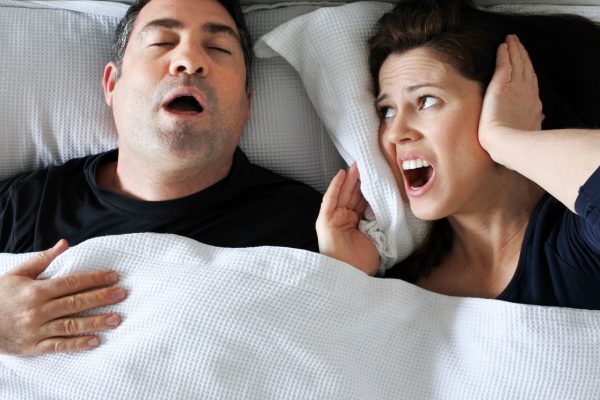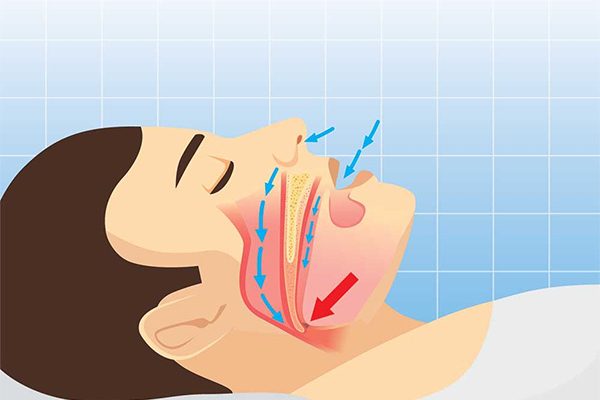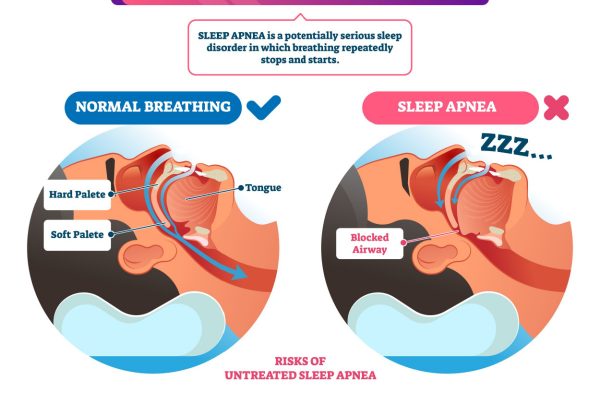Snoring or Sleep Apnea? Know the Difference
Snoring and sleep apnea are two common sleep disorders that affect millions of people worldwide. Although snoring is usually harmless, sleep apnea can have serious health consequences if left untreated. If you or a loved one snores loudly and experiences pauses in breathing during sleep, it may be a sign of sleep apnea. As a professional sleep apnea dentist in Fort Worth, TX, Dr. Sheila Birth and our staff can help you understand the difference between snoring and sleep apnea and provide effective treatment options.


What Are Snoring and Sleep Apnea?
Snoring is the sound produced when air flows past the relaxed tissues in the throat during sleep. It is a common condition that can affect anyone, but it is more common in men and people who are overweight. Snoring is usually harmless, but it can disrupt sleep quality and cause daytime fatigue, irritability, and other problems. This is especially true in the case of overly loud or heroic snoring.
Sleep apnea, on the other hand, is a serious sleep disorder characterized by pauses in breathing or shallow breathing during sleep. It can lead to a drop in oxygen levels in the blood, which can harm overall health. Obstructive sleep apnea (OSA) is the most common type of sleep apnea, where the airway becomes blocked or narrowed during sleep. Central sleep apnea (CSA) occurs when the brain fails to signal the muscles to breathe, while complex or mixed sleep apnea involves a combination of both OSA and CSA.
Symptoms of Snoring and Sleep Apnea
The symptoms of snoring and sleep apnea can be similar, but there are some key differences. Snoring is often characterized by loud, irregular breathing sounds during sleep. Other symptoms of snoring may include waking up feeling tired or having difficulty concentrating during the day.
Sleep apnea, on the other hand, is characterized primarily by pauses in breathing or shallow breathing during sleep. Other symptoms of sleep apnea may include:
- Loud snoring
- Gasping for air during sleep
- Waking up feeling tired
- Morning headaches
- Irritability
- Difficulty concentrating during the day


The Difference Between Snoring and Sleep Apnea
One of the main differences between snoring and sleep apnea is the frequency and duration of the breathing pauses. While snoring may cause occasional disruptions in breathing, sleep apnea is characterized by frequent and prolonged interruptions in breathing. These breathing pauses can last for 10 seconds or longer and can occur dozens or even hundreds of times per night.
Another key difference between snoring and sleep apnea is the impact on daytime functioning. Snoring may cause mild disruptions in sleep quality, leading to daytime fatigue, irritability, and poor concentration. However, sleep apnea can have a much more profound impact on daytime functioning, as it can lead to severe daytime sleepiness, impaired cognitive function, and an increased risk of accidents and injuries.
How Snoring and Sleep Apnea are Diagnosed
If you or a loved one is experiencing symptoms of snoring or sleep apnea, it is important to seek a professional diagnosis. A sleep apnea dentist like Dr. Birth can perform a comprehensive evaluation to determine the underlying cause of your symptoms and recommend appropriate treatment options.
The diagnosis of snoring and sleep apnea typically involves a combination of an examination, a sleep study, and a review of your medical history and symptoms. During an exam, your dentist will examine your mouth, nose, and throat for any signs of obstruction or abnormalities. They’ll also ask you about your sleep habits and lifestyle factors that may be contributing to your symptoms.
A sleep study, also known as a polysomnogram, is a non-invasive test that monitors your brain waves, breathing, heart rate, and other physiological functions during sleep. This test can help diagnose sleep apnea and determine the severity of your symptoms.

Frequently Asked Questions
Can snoring be a sign of sleep apnea?
How common are snoring and sleep apnea?
What are some lifestyle factors that can contribute to snoring and sleep apnea?
How can I improve my sleep quality if I have snoring or sleep apnea?
Learn More About Snoring & Sleep Apnea, Call us Today!
If you or a loved one is experiencing symptoms of snoring or sleep apnea, contact Birth & Fletcher Orthodontics today. Our experienced sleep apnea dentist can help identify your symptoms and treat your condition using the latest techniques and technology.
We serve Fort Worth and surrounding areas such as River Oaks, Arlington, and Westover Hills, TX. Call us today at (817) 502-9103 or schedule your appointment by filling out the contact form below and take the first step towards better sleep and improved overall health.
